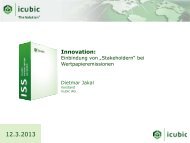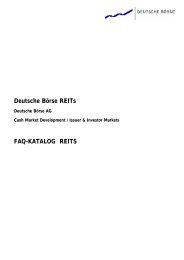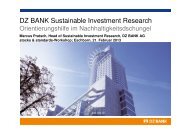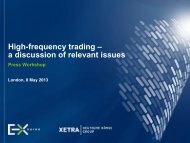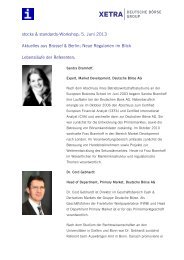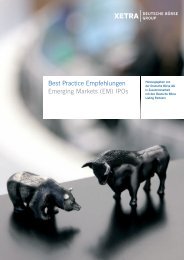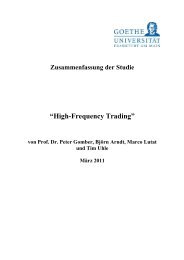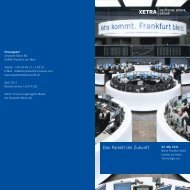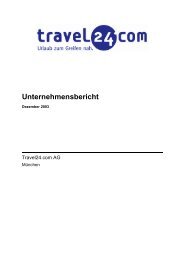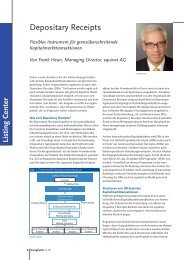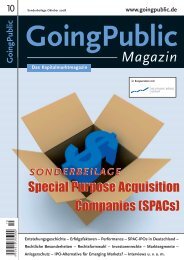Südzucker International Finance B. V. Südzucker AG ... - Xetra
Südzucker International Finance B. V. Südzucker AG ... - Xetra
Südzucker International Finance B. V. Südzucker AG ... - Xetra
You also want an ePaper? Increase the reach of your titles
YUMPU automatically turns print PDFs into web optimized ePapers that Google loves.
than the percentage-cut in tariffs as long as the currently discussed WTO-“special safeguardclause”, which allows additional import duties under certain circumstances, remains applicable.After the failure of the Cancun Conference, future results of the Doha Development Agenda areuncertain.In August 2003, Brazil complained to the WTO about European Union C-sugar exports and there-exports of sugar imported from African, Caribbean and Pacific (ACP) countries, with the aim tostop these exports. <strong>Südzucker</strong> believes there are good arguments for the European Union to win thecase. Losing C-sugar exports would have adverse consequences for the <strong>Südzucker</strong> Group’s results ofoperation. The abolishment of ACP-re-exports would reduce the domestic market for European beetsugar by 1.6 million tons of sugar, which would have more pronounced negative effects on the<strong>Südzucker</strong> Group as compared to the loss of C-sugar exports. A decision is expected in 2004.Declassification and production levyIt is possible for the EU Commission to temporarily lower the maximum EU production quota(“declassification”) in order to track changes in consumption and exports and thus comply with WTOcommitments. In 2001, the EU Commission made no use of the declassification. In September 2002, ahigh EU declassification coefficient of 5.7% was set for production from the 2002/03 campaign.The basic overall production levy on B-sugar for the 2001/02 sugar year reached the maximumproduction levy of 39.5% of the intervention price. Furthermore, a supplementary levy of 8.3% wasagreed. Contrary to the sugar year 2002/03 the overall production levy on B-sugar was only 22.0% ofthe intervention price and no additional levy was necessary. This displays the self-financing characterof the sugar market regime. In years with a high declassification quota sugar exports are lower anddue to this production levy declines.EU member candidatesThe governments of all EU candidate countries have agreed to the EU membership treaties. Thismeans that the expansion of the EU by a further 10 countries on May 1, 2004 can be completed asplanned.With respect to sugar, the EU has made considerable concessions to its negotiation terms on sugarproduction quotas for the applicant countries. The largest quota holder is Poland, with a maximumquota of 1.674 million tonnes of sugar, followed by the Czech Republic and Hungary with 0.454 milliontonnes and 0.402 million tonnes of sugar, respectively. <strong>Südzucker</strong>’s quota share in EU-25 will behigher than it was in EU-15 because of strong market shares in Poland, the Czech Republic, Hungaryand Slovakia. The <strong>Südzucker</strong> Group expects to benefit from the EU-enlargement.EU sugar production up by 11%Sugar production in the EU reached 17.02 million tonnes (14.94 million tonnes), back to almost thesame level as in 2000. The main reason for the growth in 2002 was a rise of 2.7% in the area undercultivation for sugar beet in the EU, to 1.835 million hectares (1.788 million hectares) and in sugarproduction to 9.06 tonnes per hectare (8.11 tonnes per hectare). Almost 912,000 tonnes (385,000tonnes) of C-sugar was transferred to the 2003/04 sugar year.Performance of the Sugar SegmentBeet harvest and sugar productionThe area under beet cultivation for the <strong>Südzucker</strong> Group in the fiscal year 2002/03 rose to 472,400hectares (465,100 hectares). The reduction in area under cultivation due to the disposal of Veurne,28




